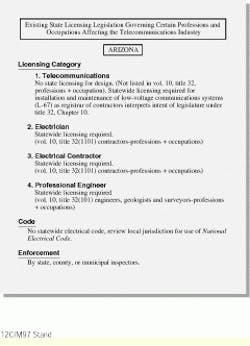Study analyzes state telecom-licensing requirements
Anthony T. Minichiello
Maximis Communications Consultants
Today, approximately 500,000 systems technicians, installers, and contractors are gainfully employed in the estimated $1 billion telecommunications industry in the United States. And yet only 10 states have existing legislation that regulates the practices of these individuals. The technicians, installers, and contractors who work in the other 40 states and in Washington, DC, remain unlicensed and unregulated.
However, even though they are not licensed or regulated, most people in this line of work are well versed in the general principles and fundamentals of telecommunications systems installation, including relevant codes and regulations. Chief among these codes and regulations are the National Electrical Code (nec) and standards issued by the American National Standards Institute.
At a recent conference of the interNational Electrical Contractors Association (neca), Charles Fisher, executive assistant to the international president of the International Brotherhood of Electrical Workers, sounded the call to all neca members when he stated, "Telecommunications work will be the highest source of employment in the next decade. If we don`t secure the market now, we will lose it and we`ll never get it back."
The engagement has already begun. In Massachusetts, House Bill 2288 has been introduced to the state senate. The bill calls for licensing requirements for any contractor that installs optical-fiber systems, communications systems, or data-processing systems. The proposed legislation, if passed as currently written, would include not only the system components, but also pathways and spaces. The bill also stipulates that licensing requirements will be overseen by the same individuals who oversee the licensing of electricians.
Telecommunications, generally defined as the sending and receiving of voice, sound, data, and video transmissions, is a discipline of its own and an industry unto itself. As such, it cannot avoid regulation. However, state-level legislation such as Massachusetts`s House Bill 2288 can make it illegal for any existing unregulated telecommunications professional to design, install, or maintain a telecommunications system.
Regulated tradespeople, including electricians and electrical contractors, have been the driving force behind legislation such as this. In the states in which legislation has been passed, these regulated trades have seen to it that unregulated telecommunications professionals cannot perform their work without obtaining an electrician`s license or being granted an exception by a state board of examiners.
When legislation like this is passed, the potential exists for electrical inspectors to be dispatched to cities and towns to close down all telecommunications projects that are not being installed by licensed electricians or other approved personnel.
To the many thousands of unregulated telecommunications workers who are likely to be affected by legislation like this, I suggest the following three steps.
- Let your legislators know your concerns. Attend public hearings, voice opposition to proposed legislation, and recommend other courses of action the legislature can take.
- Form an organization of telecommunications companies that is prepared to sue the state to obtain a restraining order to keep electrical inspectors from closing down projects, in the event that legislation passes.
- Form an organization that will submit legislation through local legislators to establish a telecommunications law that is subject to regulation and licensing in the public interest. It is a tall order, but one that was accomplished in Rhode Island in 1994.
In January 1997, bicsi (Tampa, FL) asked me to research existing state legislation governing certain professions within the telecommunications industry, and to create a directory of such legislation for the organization`s members. The project was intended to explore the status of telecommunications regulations, or lack thereof, in the United States on a state-by-state basis.
I developed flexible guidelines for the directory, because state statute books are organized differently, and I investigated existing statutes. I studied 2161 statute books, 1825 supplemental updates from the year 1996, and 150 index books, for a total of 4091 references.
Through my research, I discovered that 10 states--Arizona, Connecticut, Georgia, Minnesota, New Jersey, New Mexico, Oregon, Rhode Island, South Dakota, and Wyoming--have existing statutes regulating the licensing of telecommunications operations.
The directory, titled Existing State Licensing Legislation Governing Certain Professions and Occupations Affecting the Telecommunications Industry, lists each state, and indicates whether the laws of that state provide for licensing of the following occupations: telecommunications workers, electricians, electrical contractors, and professional engineers. Each entry references which laws, if any, apply to each of the four professions. Each entry also indicates whether the state uses the nec, and what party or parties are responsible for enforcing licensing laws.
For a complete directory listing, refer to bicsi`s Web site at www.bicsi.org. A word of caution, however: Even though the directory pages for individual states do not include existing state statutes, several cities and counties have enacted local ordinances requiring certain types of permits, licenses, or examinations.
Many of you may soon be asked to participate in the enactment of legislation that would license professionals in the telecommunications industry. While the process can be slow and laborious, the payoff may be a brighter future for telecommunications professionals in your state. q
Anthony T. Minichiello is the principal of Maximis Communications Consultants (Concord, NH). An honorary life member of bicsi, he sits on that organization`s governmental relations and publications advisory committees.
A sample page from Existing State Licensing Legislation Governing Certain Professions and Occupations Affecting the Telecommunications Industry outlines the Arizona laws governing the licensure of telecommunications professionals, electricians, electrical contractors, and professional engineers. It also explains the state`s use of the National Electrical Code and lists the agencies responsible for enforcing licensure laws.

